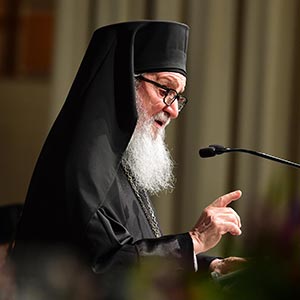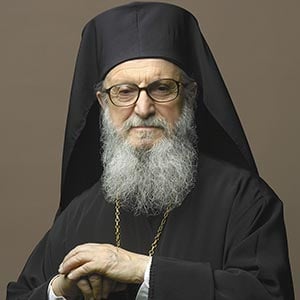Archpastoral Reflections
September, 2008
The theme of our Clergy-Laity Congress this past July, “Gather My People to My Home,” presents several challenges and questions that are important to consider. For example, what images do we call to mind when we hear the term “Home” as used in the theme? How are we the voices of Christ, who act as His servants to “Gather” God’s people to His Home? What do we exactly mean when we use the term “Gather?” And what is the precise meaning of the word “People” as employed in the theme? These and related questions and challenges will serve as topics for reflection over the next few months. We begin this month by rising to the challenge of more fully appreciating the term “My” as used in the language of the theme.
The term “My” in our theme is a clear reference to God, the Creator of the universe and of all humanity. Note that this term is used in the first person possessive case. The theme, in other words, understands the terms “people” and “home” as meaning God’s people and God’s home. As it applies to people, it is appropriate to speak of a broad rather than narrow understanding of humanity as “God’s people.” A broad interpretation of humanity without any exclusions, discriminations, or exceptions is entirely consistent with Christ’s parable of the Great Banquet in the Gospel of Luke, where the substance of our theme is vividly expressed. In that parable, the householder, who symbolizes God, tells his servant to "Go out quickly to the streets and lanes of the city, and bring in the poor and maimed and blind and lame…go out to the highways and hedges and compel people to come in, that my house may be filled " (Luke 14:21-23). Notice the great lengths to which the householder goes. He goes to the people on the streets and lanes, on the highways and the hedges, in other words, to those people who make their “homes” in the margins of society. In this sense, “God’s home” is also identified in broad rather than narrow terms.
This passage from Luke is compelling of how God communicates directly to us that “His people” includes the entirety of humankind and that “His home” includes the entirety of our planet. The implications of this understanding for our theme of “Gathering God’s people to His Home” are tremendous because it means that our work is unlimited. It means that our mission has no boundaries. It means that we are called to gather every human being of every continent to God’s Home. We do this not in a propagandistic way or in a manner that proselytizes people of other faiths, but, rather, to share with others the love that God extends equally to all people regardless of our level of familiarity with them, or of their social or economic position. It also means that as we invite others to our parishes, and thus to the House of God, we do so with unconditional love and respect, and that we view all others as icons of God, created in His image and likeness.
This brief reflection has endeavored to serve as a preview of the next series of reflections over the forthcoming months. Many of the ideas presented here require independent space in order to be developed thoroughly. This will be our collective task which all are invited to join, as we, the Greek Orthodox faithful of America, embrace the challenge of gathering God’s people to His home.
+DEMETRIOS
Archbishop of America

